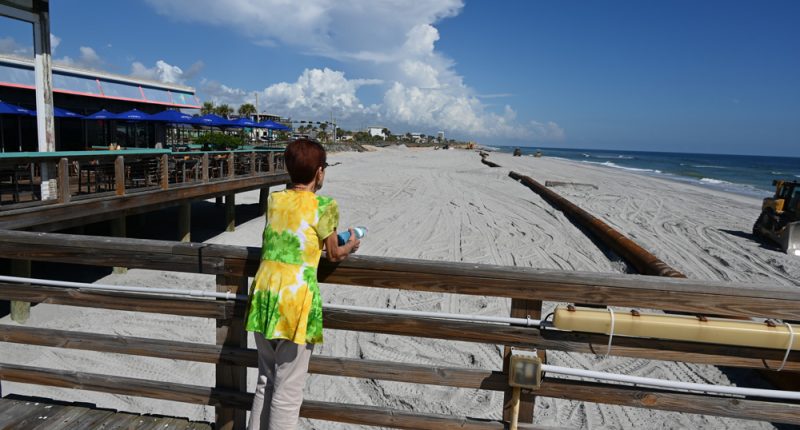
The first thing we might as well acknowledge is that in the battle between sea and shore, the sea will always win. It’s not even a battle. It’s natural history. We’re not helping. We’re causing the warming that’s precipitating catastrophic effects from coast to coast and across the world. Thanks to climate-denialism in Washington and Tallahassee, we’re fueling warming’s effects with idiotic accelerants like “resiliency” instead of taking the only measure that makes a difference: reducing greenhouse gas emissions.
 Ultimately nothing will be so catastrophic as sea rise. You can build back from a hurricane or a forest fire. You can’t build back on water. According to the Florida Climate Center at Florida State University, the state’s 8,400 miles of shoreline are being redrawn as we speak.
Ultimately nothing will be so catastrophic as sea rise. You can build back from a hurricane or a forest fire. You can’t build back on water. According to the Florida Climate Center at Florida State University, the state’s 8,400 miles of shoreline are being redrawn as we speak.
After stable sea levels for thousands of years since the last ice age 20,000 years ago, sea levels rose 7 to 8 inches since 1900, with half that rise happening since Bill Clinton and Al Gore were elected in 1993. The projection is that the sea will rise roughly from 2 to 7 feet by 2100, and from 2.6 to nearly 13 feet by 2150. That’s higher than the highest dune and the highest seawall in Flagler Beach.
Put another way: Flagler Beach’s days are numbered. If you think 2100 and 2150 are beyond your horizon, they’re not much beyond that of your children and grandchildren, and even that bit of self-absorbed absolution may be misplaced. NASA and its European equivalent are seeing a much faster acceleration of sea rise, making likelier and sooner the upper end of those projections, or worse. Exact projections aside, the flooding catastrophes won’t suddenly begin in 2050, 2100 or 2150. We’re already there. Remember Hurricanes Matthew and Ian and the transformation of parts of the barrier island into rivers and lakes. That’s our normal now.
Resilience as define by Florida government (rebuild, just rebuild higher and thicker) is an illusion. It is as absurd and useless as the fallout shelters of the 1950s. Everything from here on is prevention. Or at least delaying the inevitable. If we can buy another century of relative safety, by which time maybe technology will have caught up enough to reverse climate change’s course, it becomes our imperative to do so.
I realize that I am contradicting what I wrote in 2018, when I called it futility. It may yet be. But the cost of delay and the bet on a future solution is worth the price.
That’s the price Flagler County government is proposing we all pay–all of us, from the barrier island to west Flagler. County Administrator Heidi Petito and Deputy Administrator Jorge Salinas have produced a plan that would have the county bear the responsibility of all beach renourishment and maintenance from here on.
It’s unfortunate that the administrators did not get this vetted and approved by the County Commission first. The administration has often had a blind spot when it comes to strategy, although this may be by design. It allows the commission to take the credit for the plan if it succeeds, and to blame the administration if it fails. It’s cynical and short-sighted. But courage in government is rarer than astatine. So it’s not a perfect rollout and it’s not a perfect plan.
But don’t let perfect be the enemy of good. This is a deliberative process. It gets better with time, cooperation and good will. The way there is to focus on the substance of the plan rather than the trappings of its politics. As such, Petito and Salinas should be commended. They’ve done the near-impossible: they’ve produced a pragmatic and reasonable plan.
The county is willing to rebuild the beaches with existing funds that don’t implicate the cities. But maintaining and renourishing them will be more expensive. That plan needs an additional $12 million a year.
Revenue would be drawn from a variety of sources. No one’s property taxes would be affected beyond the fraction the county is already appropriating. Revenue from the existing tourist tax would account for $2 million ($1 million of it from the capital fund, at least for three years). Only barrier island residents would have to pay an extra $160 a year as part of a special taxing district, since they stand to benefit most from the protection of their property. It seems like a lot. But that’s less than one month’s water bill, less than a thirtieth of what some people pay in property insurance on the island, if they can even get it. The barrier island tax would net $1.7 million a year.
The bulk of the revenue, and the political third rail ahead, centers on a half-penny increase in the local sales tax, which would generate over $10 million total. Flagler Beach would have to cede all its share to the county. Palm Coast and Bunnell would have to cede half. The county itself would appropriate all its revenue from the half penny to beach management. (Shares from the other half penny, already in place, would not be touched.)
It’s not a lot to ask, except politically. None of the cities lose money. Palm Coast and Bunnell gain revenue, in exchange for supporting the county’s new sales tax. Flagler Beach and the other barrier island burgs don’t get a penny from the new tax. But they get a far bigger windfall. They no longer have to worry about beach maintenance, and they get their beaches rebuilt and maintained. Not bad for $277,000 a year, if you’re Flagler Beach (the amount the city would be ceding in new sales tax revenue, which it can make up and double if it got off the pot and enacted an overdue paid-parking plan).
For Flagler Beach especially, that guarantees the next round of Army Corps renourishment. Without the cities’ agreement, that project and any other beach management in Beverly Beach and Marineland is dead, as will soon be their beaches.
The future is not a mystery, because it’s already a few decades old. Unfortunately, Palm Coast is already killing the plan by deflecting to a referendum–the indemnifying catch-all for leaders who don’t have the guts to do what they know must be done, and who know that they can guillotine the proposal at the ballot box. (Palm Coast has experience: its bond referendum just failed.)
If Palm Coast and Flagler Beach turn down this plan, as now seems likely, they’ll be assisting in the beaches’ suicide. Without beaches, Flagler Beach itself is a city economically crippled and geographically term-limited.
Palm Coast and Beverly Beach have previously insisted that they won’t put up a penny for the beaches. Here’s their chance not to do so, while still coming out ahead, with an additional $2.7 million a year for Palm Coast. A more equitable plan that still gets the job done is not likely. And time is not on anybody’s side.
“Old Florida is a glassy figment in the minds of the soon to be deceased,” goes the line in the Karen Russell short story about a submerged Florida but for a few Venice-like spots. When fiction becomes our children’s reality, perhaps it’s time to realize that it won’t be long before even the sand burying our heads is gone.
![]()
Pierre Tristam is the editor of FlaglerLive. A version of this piece airs on WNZF.










